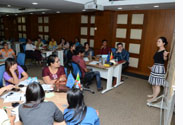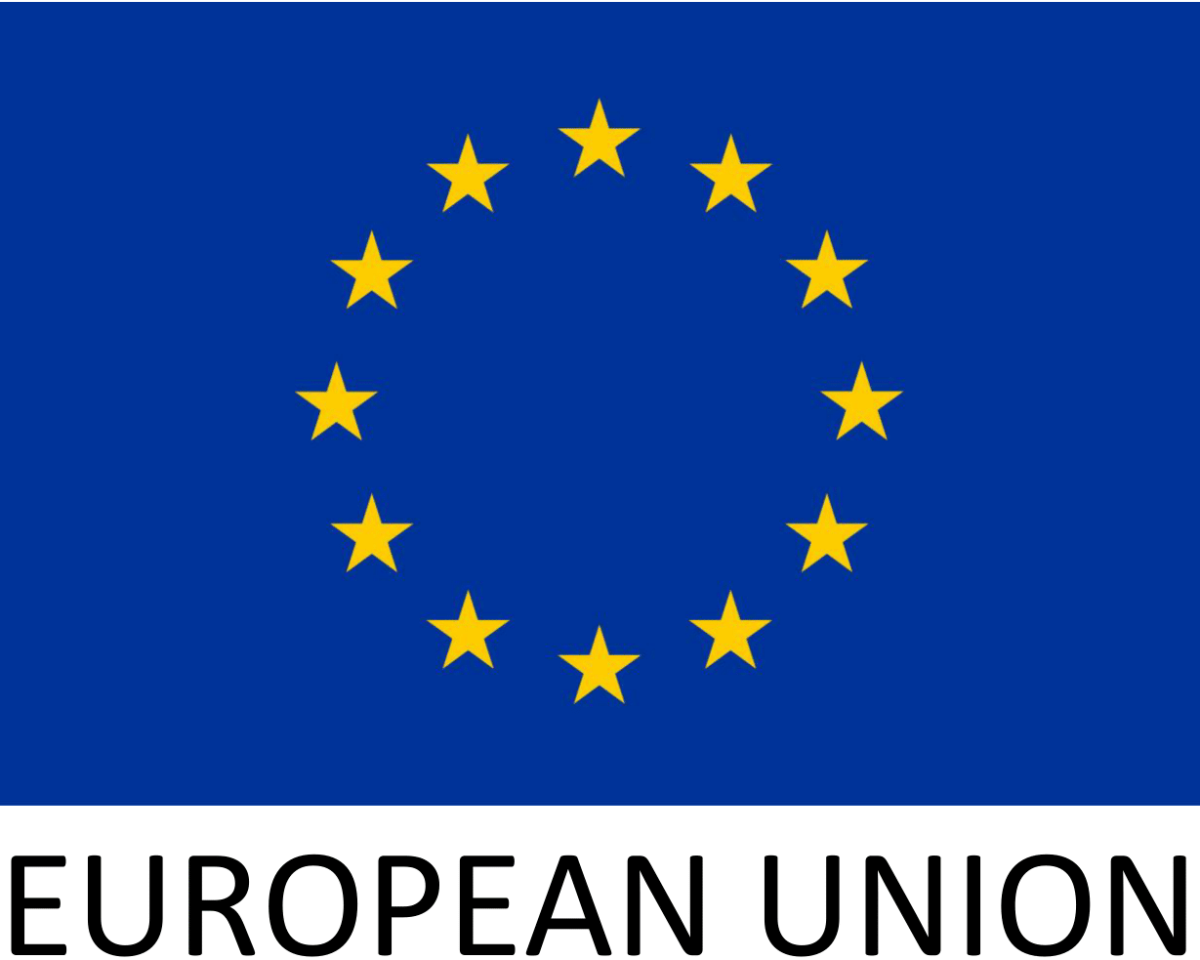 Applying good working conditions boosts confidence and competitiveness of local garment industry as they embrace international trade.
Applying good working conditions boosts confidence and competitiveness of local garment industry as they embrace international trade.
The textile industry in Myanmar is still young. Systematic management education at production sites that emphasises the business relevance of good employment conditions and that strengthens the managers’ people skills is needed. However, since the local industry is just starting to open up and develop, corporate structures are not yet fixed and relevant actors are keen to enhance their international attractiveness, which offers an excellent window of opportunity to provide capacity building.
Noticing this need and related opportunity, the EU funded SWITCH-Asia project SMART Myanmar has launched the “Compliance Academy”, an innovative approach for social responsibility that imparts knowledge and methodological competencies via an individualized learning environment that uses lectures, case studies, multimedia sequences and exercises to help develop targeted solutions to the participants’ challenges. The key to success is the in-factory consultancy visits of experts to improve their internal own management system and procedures to maintain good working conditions long term rather than choosing a “quick fix” approach.
From consulting to establishing an Academy
Since 2013 SMART Myanmar has been consulting Myanmar factories in the garment sector to enhance their accountability and competitiveness. In so doing, the project detected a strong need for improved social and environmental standards in local factories where limited knowledge exists on Cooperate Social Responsibility (CSR) and Sustainable Consumption and Production (SCP).
In order to support the local garment industry embrace compliance standards, SMART Myanmar started by training the SCP staff of the Myanmar Garment Manufacturers Association on national labour and OHS laws. ILO added to that by training them on industrial relations. Site visits to local factories followed, where attention was drawn to the importance of complying with social and environmental standards and where need analysis were conducted combined with consulting the factories on lean management.
SMART Myanmar discussed with a core group consisting of the top management representatives of locally owned garment factories on their strategy to export to EU markets, the problems they face when doing so and their mind set regarding the improvement of working conditions.
In cooperation with several well known international experts in the field of social compliance specialised in garment and textile supply chain, SMART decided to launch a Compliance Academy. The SMART Myanmar Compliance Academy is based on a product developed by Systain. Systain is an internationally operating CSR strategy consultancy. As an expert for global and complex value creation, Systain generates solutions to worldwide challenges regarding environmental, working and production conditions. In its first pilot phase, the academy addressed ten “best” factories that had been selected by SMART according to their interest in European markets, their mind set to drive necessary changes in their factories and their progress made so far with the suggestions previously offered by SMART. To pilot changes on factory level, the best 3 factories were then chosen to be part of the in-factory consultancies included into the Compliance Academy services.
How the Academy works
The first SMART Myanmar Compliance Academy comprised of three workshops for participants from ten factories and three intensive on-site consultancies for a focus group from three factories. It was implemented between September 2014 and January 2015 to allow the factories sufficient time to make necessary changes at their site.
The target participants of the Academy were middle management staff but included also some top management representatives. All factories sent their HR management and, those who had already established compliance teams sent their representatives.
During the workshops tailor-made trainings with individual assistance by experts were offered in management of social compliance issues, including root-cause analysis, mapping of processes and structures, implementation of social compliance policies, communication between workers and management. The workshops applied various learning methods such as lectures, multimedia presentations, case studies and learning based on experiences so to foster individual understanding and increase learning success. With a strong focus on peer learning, they allowed participants to share their individual experiences and work together with case studies, thus internalising the management practices even better.
Three factories that were highly motivated and committed were then selected to work closely with the international compliance consultant and the SMART team for on-site factory assessment and improvement. The on-site visits focused on the analysis of necessary improvements and their root causes as well as the improvement of the current practice regarding working conditions. The consultant team, comprising of SMART and systain expert Nancy Fend, supported the factories by designing management policies and procedures to sustainably improve the system for good working conditions in the factory.
Additionally, SMART also funded a legal expert from Polastri & Wint to clarify on Myanmar's current labour laws. An overview was produced and published on MGMA's website http://www.myanmargarments.org/factory-information/laws-regulations/ that has been used by many buyers and factory owners to get a better understanding on the current rules and regulations in Myanmar and also to motivate local factories to comply with it. SMART Myanmar also provided technical assistance to build and manage the MGMA website as a knowledge management tool on SCP for businesses in Myanmar and international businesses.
Academy results
The pilot project of the SMART Myanmar Compliance Academy was very well received by all participants. At the end of the project, the three factories from the focus group shared their learning, achievements, challenges and future plans to motivate other factories, and provide them with valuable and practical information.
“I had the social audit from customers before, but they just check and then go. They didn’t tell us how to improve. After the SMART Myanmar Compliance Academy, we understand how to fix the issues in short term and long term.”, said the General Manager of Maple Trading Company.
Following their participation to the Academy, the focus group factories reported noticeable achievements on various areas despite the limited time duration of the academy. All of them made improvements on their internal policy establishment especially for HR and Health & Safety management.
After completing the Academy, all participating factories have established a comprehensive child labour prevention and remediation policy with a strictly defined age verification process “After the first audit of an EU brand, I was so stressed out and worried because we didn’t pass it. But now I learned how to write a policy and describe procedures. I can assure that everyone follows the procedure and that guarantees the compliance.”, explained the CSR manager of Myanmar Synergy Company.
For health and safety, the management teams got a better understanding about the requirements on each related aspect and took actions to correct current practices, such as the management of fire fighting equipment, evacuation maps, fire exits etc. To prevent the recurrence of the same issues, the factory managers understood the importance of the OHS (occupational health & safety) policy and developed this accordingly. Dedicated teams were formed with clear responsibilities, work procedures, supporting documents and evaluation methods.
With regard to working hours, the factories have paid high attention and worked closely with technicians and the production team to reduce overtime gradually, with one of them already reporting a weekly reduction of 5 hours in their overtime.
Despite this encouraging good start in the right direction, many challenges remain for factories to comply with other international standards, such as the difficulties to get ID cards, the high costs on building safety inspections and the limited knowledge and skills on management systems. All of the factories need to continue their work and follow up visits from the Academy Experts to further support the factories in their own efforts to increase their standards are forseen.
Coming up next: more in-factory consultancies to improve management and policies and an academy for local government officials
Follow-up actions of the Academy will be discussed a workshop on 13 February 2015 of top level management of MGMA and the local Myanmar garment factories, in combination with a set of planned activities that complement also the follow up of the MGMA voluntary Code of Conduct for the garment industry of Myanmar. The demand for the SMEs is there: after presenting the results achieved, all participants requested in-factory support to improve the working conditions in their factories as well.
From its side, the internal capacity of the SMART project team has meanwhile also been strengthened by their direct participation to the activities and site-visits of the Academy. This paves the way for the long-term development of local capacity in this specialised field of SCP services which is key as the local industry needs experts in this area but currently lacks any kind of service offer.
With regard to the work initiated in the field of labour law, although revisions to current legislation are viewed necessary by some international experts, more importantly all stakeholders involved in improving the working conditions in the garment sector agreed to the need of strengthening enforcement of the current laws.
For this reason, SMART is now developing a special Compliance Academy targeting the government authorities that are responsible to enforce the current labour law and the soon to be published new OHS law. This training will target the factory inspectors of the Ministry of Labor to get a better understanding on how to assess the current compliance level in the factories, what can improve the current compliance level and to give them the understanding that compliance is a process that cannot be reached from one day to the next. Monitoring tools to help them assess the current situation and the progress will be given to them from May onwards.
The whole garment sector will benefit from this because this would translate into a predictable and fair inspection process beneficial for the workers and doable for the factories.










